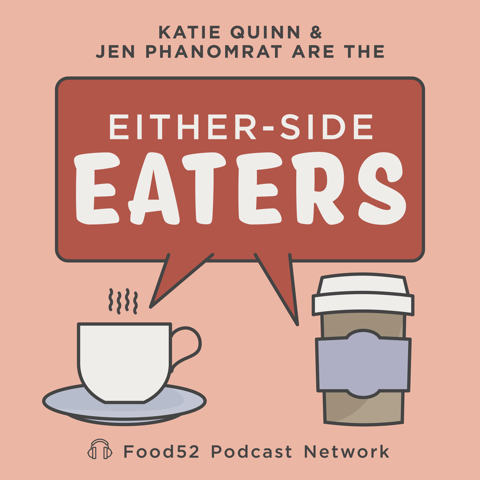
On our new weekly podcast, two friends separated by the Atlantic take questions and compare notes on everything from charcuterie trends to scone etiquette.
Listen NowPopular on Food52
9 Comments
Anne
May 2, 2019
I have mixed feelings about this. I’d love to live like that, but I’m thinking that, if we all did, a lot of worker’s job would no longer be necessary, due to greatly reduced demand. I have no solution.
Moire
April 28, 2018
Extremely ironic that this site would promote a hook about minimalism. They sell a lot of good products, but haven't found one that I NEED.
Rick
March 4, 2018
It's key to realize this woman wasn't living on a huge salary. If $28,000 is 51% she was making $60,000/year or so. Of course if that was $60,000 take-home, she's likely grossing more like 85k or $90k.
Still, I think the takeaway here isn't to do precisely what she did but to consciously make decisions vs simply buying things because. Do you really need the new HDTV or are you just buying it because it's on sale? Is the 12th handbag really something you need or is it a socially driven habit?
Too often we hear people complain that they make X and just can't get ahead... to me this is a call to think about how you're spending and why and to more closely align those choices with the things yo u really want out of life. If that's travel... perhaps live with the TV you have or forego the cute handbag. Buy a used car (or keep yours) vs buying a new one.
Still, I think the takeaway here isn't to do precisely what she did but to consciously make decisions vs simply buying things because. Do you really need the new HDTV or are you just buying it because it's on sale? Is the 12th handbag really something you need or is it a socially driven habit?
Too often we hear people complain that they make X and just can't get ahead... to me this is a call to think about how you're spending and why and to more closely align those choices with the things yo u really want out of life. If that's travel... perhaps live with the TV you have or forego the cute handbag. Buy a used car (or keep yours) vs buying a new one.
Djay
March 4, 2018
Interesting in that I cannot see me paring down that far. I think it takes a certain amount of confidence in oneself that I don't have. On the other hand, I have been sorting, de-cluttering and purging stuff for several years on and off and am now climbing out of the major debt all that stuff created. I have found that, for me, it happens in layers. What I couldn't think of re-homing last year, I can this year. I still have tons to sort through, but always with the thought of whether I would miss a particular object if it were gone. So far, there are clearly too many things that still carry that provision. It's a process. You have given me a lot to consider.
Ming H.
March 3, 2018
Thanks for posting this excerpt. I was a binge consumer as well, to the tune of almost six figures if stupid materialistic things that never got used (e.g. watches, clothes, etc.). These purchases were during my regular employment years, as the money was constant and felt like it would never end. Until it did early last year.
Since then, I've sort of had a reawakening as far as my life and just how much waste and needless things there was in it. So I decided to purge and am still doing so now. It's actually quite amazing how many physical items we hold onto and place value on simply because we own it. A watch that's worth $5,000 doesn't increase in value just because it's mine. That was a hard concept for me to grasp until I got rid of things, and I believe that's probably the mindset that besets hoarding.
Like the author, I've always been a travel bug and have realized life is less about what I own and more about what I experience. In the past year alone, I've managed to travel to Utah, Scandinavia, Italy twice, Malaysia, and Singapore. And look forward to more.
Here's to overcoming the sickness that is consumerism.
Since then, I've sort of had a reawakening as far as my life and just how much waste and needless things there was in it. So I decided to purge and am still doing so now. It's actually quite amazing how many physical items we hold onto and place value on simply because we own it. A watch that's worth $5,000 doesn't increase in value just because it's mine. That was a hard concept for me to grasp until I got rid of things, and I believe that's probably the mindset that besets hoarding.
Like the author, I've always been a travel bug and have realized life is less about what I own and more about what I experience. In the past year alone, I've managed to travel to Utah, Scandinavia, Italy twice, Malaysia, and Singapore. And look forward to more.
Here's to overcoming the sickness that is consumerism.
heatheranne
March 1, 2018
I'm always fascinated by how people manage their money, and the things they spend it on. I always wonder how some people go travelling so much...at least it seems that way on social media! I can never afford to travel that much...and I budget to the last dime, and don't spend money easily (even when I should...like on clothes!). But then I realized that I think I just don't value it as much as others and thus I am not willing to spend as much money on it. I have a decent salary and no debt (I worked hard to pay off all my student debt), I have a good sized emergency fund, and I'm able to save every month for retirement (although I doubt I'll ever be able to do that!). But, I live in an expensive city with all that entails (rent etc.). I also have a couple expensive sport hobbies that keep me occupied and happy through the summer and winter. If I took the money I spent on those, I could definitely do a ton more travelling. But I realized this past summer that I would be happy most of the time, rather than be happy for a week in Europe, but then have no money to do anything fun at home the rest of the time. Same thing with my rent. I could find a cheaper place, but it would mean living in crappy basement apartment in a crappy part of town. But, being somewhat of a homebody, I want a place I love because I'm there every day. That's worth more to me than travelling. But to each their own...if travelling is important, then finding a way to make that happen without going into debt is great!
Taylor B.
February 28, 2018
Do you have a monthly breakdown of where you spent your money? For example how much did you spend per month on rent/mortgage, utilities, groceries, cellphone/internet. Paying off debt is all well and good, as is living off less. But I’m curious how realistic this is if you support a family, mortgage, etc. Thanks!
EmMa
April 27, 2018
I couldn't agree more; these types of books, articles, etc. all seem to come from single people with above-average incomes living well outside of major cities. These percentages don't apply to the majority of people in this (or many other) countries!






Join The Conversation